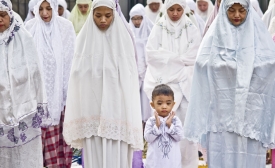public diplomacy
After a slew of negative opinion polls, China is working to improve its global image. A global opinion poll by WorldPublicOpion.org found that public views of China have declined. Another poll – conducted by the Pew Research Center - found that United States’ global image remains more positive than China’s.
In updating its security strategy, the EU should avoid setting itself unrealistic ambitions. Restoring Europe’s soft power means, first and foremost, putting Europe’s own political and economic house in order.
The religionization of politics and the politicization of religion, especially in the current environment on the global war on terror, means that increasingly religion plays a role in diplomacy both as an opportunity for engagement and as a motivation inspiring actors.
Duquesne University professor Greg Barnhisel skillfully shows how modernist art and literature was used to influence the Cold War game.

More from the MPD Indonesia delegation, this time on faith diplomacy.
The legacy of Lee Kuan Yew, the founder and longtime leader of modern Singapore who died on Monday, is often framed as a lesson in nation-building and global statecraft. In the Los Angeles Times, Harvard’s Graham Allison recalls that every Chinese leader since the death of Mao has cited Lee as a mentor; Lee’s brand of “authoritarian capitalism” is often invoked with reference to Narendra Modi or Vladimir Putin.







